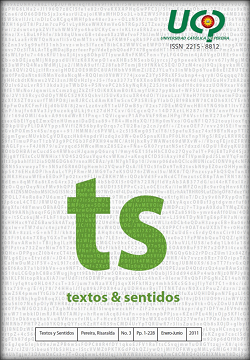Communication, narratives and learning process: Television receptions and production of meaning
Keywords:
mass media narratives, mass media reception, meaning production, , meaningful learning processAbstract
This article presents the research results Educational readings of television. Learning on the reception, from narrative analysis of three diff erent programs (documentaries, fi ction stories and tv news) and the readings by 36 adolescent from Manizales. The conclusion was when the television´s narrative has a highly structure propositional generates meaningful learning in audiences. This event has a source from television´s stories are proposed to audience active the meaningful learning process, without the content been explicitly educational. For the comprehension process about social environment, is necessaries a previous condition, the narrative structure of television´s programs must be highly interpellative, in other words, the narrative may contains stories about the world what propitiates the formation of creative association between content programs and the precedent knowledge from audience. This research concludes that the educational potential from television is based in the narrative way condition.References
Ausubel, Novak (1983). Psicología Educativa. México: Editorial Trillas.
Bruner, Jerome (1998). Acción, Pensamiento y Lenguaje. Madrid: Alianza Editorial.
Delgado, J.M., Gutiérrez J. (1999). Métodos y Técnicas Cualitativas de Investigación en Ciencias Sociales. Madrid: Editorial Síntesis.
Eco, Umberto. (1989). La Estructura Ausente. Introducción a la semiótica. Barcelona: Lumen.
Eco, Umberto (2005). Tratado de Semiótica General. México: Ediciones Debolsillo.
Fuenzalida, Valerio. (2005). Expectativas educativas de las audiencias televisivas. Bogotá: Editorial Norma.
Grandi, Roberto (1995). Texto y Contexto en los Medios de Comunicación. Barcelona: Icaria Editorial.
Hall, Stuart. Codificar y decodificar. (Portal en Internet) Nombre Falso. Comunicación y sociología de la cultura. Traducción de Silvia Delfino. Texto en Pdf. pp. 7 Disponible en: http://www.nombrefalso.com. ar/apuntes/pdf/hall_3.pdf Acceso en octubre de 2005.
Metz, Christian y otros. (1976). Análisis estructural de relato. Madrid: Ediciones Niebla.
Morley, David (1996). Televisión, audiencias y estudios culturales. Buenos Aires: Amorrortu ediciones.
Ong, Walter (1994). Oralidad y escritura. Tecnologías de la palabra. Bogotá: Fondo de Cultura Económica.
Peña Herborn, Jorge. Perspectivas Acerca de la Influencia de los Medios de Comunicación de Masas en la Opinión Pública. Universidad de Santiago. http://rehue.csociales.uchile.cl/publicaciones/mad/02/ paper06.htm consultado en el mes de agosto de 2006.
Rincón, Omar (2006). Narrativas mediáticas. O como se cuenta la sociedad del entretenimiento. Barcelona: Gedisa editorial.
Thibault-Laulan, Anne Marie (1973). El Lenguaje de las Imágenes. Estudio Psicolingüístico de las imágenes visuales en secuencia. Madrid: Ediciones Morova.
Vigotsky, Lev (1995). Pensamiento y Lenguaje. Buenos Aires: Editorial Paidós.

